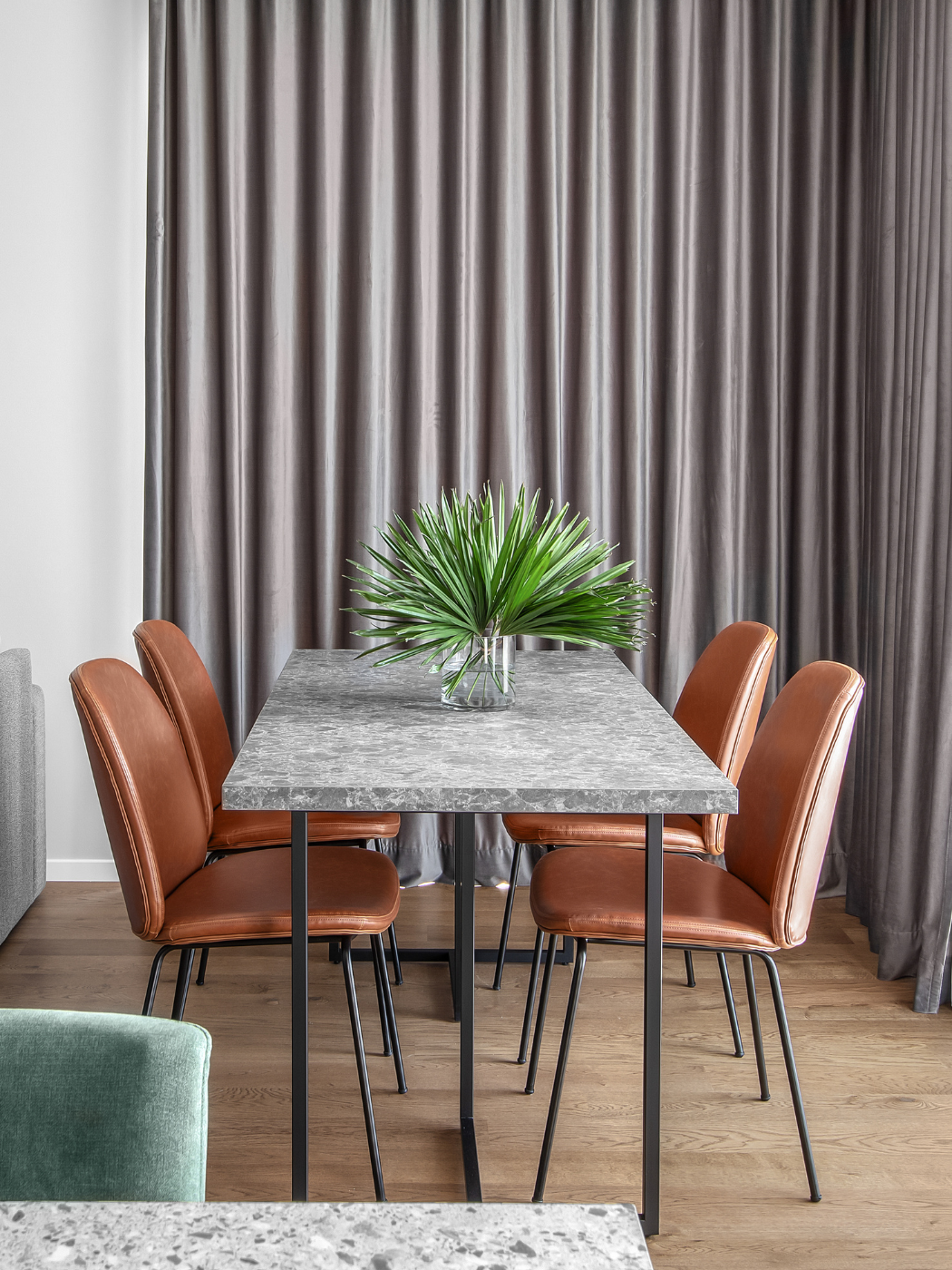
A Guide to the World of Marble Furniture
Marble furniture brings timeless appeal and luxury into any space. Known for its elegance and durability, marble has been a favourite material for centuries.
If you are considering buying Marble furniture, first explore the latest trends, how to care for marble pieces, and tips for selecting the perfect marble table furniture for your home.
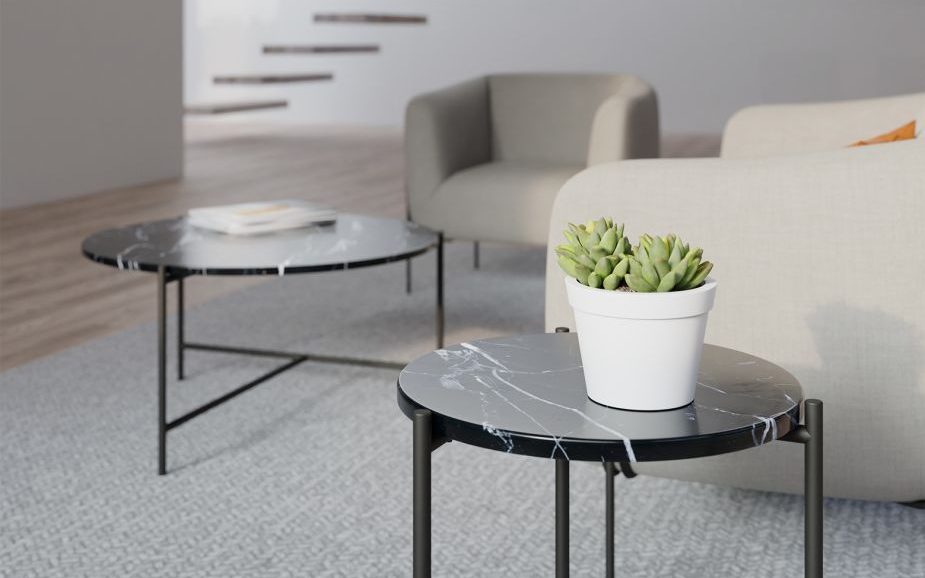
The Creation Process: How is Marbles Made
Marble is formed through a process called metamorphism, which is the transformation of existing rock types into new rock types by heat, pressure, and/or chemically active fluids. Marble is specifically derived from limestone or dolomite rock through this process. Here’s a simplified explanation of how marble is made:
| Starting Material | The process begins with limestone or dolomite, which are sedimentary rocks composed primarily of minerals like calcite (a form of calcium carbonate) or dolomite mineral. |
| Heat and Pressure | Over time, geological processes such as tectonic plate movements can bury limestone or dolomite deep beneath the Earth’s surface, where they are subjected to high |
| Metamorphism | The intense heat and pressure cause the calcite or dolomite minerals in the limestone or dolomite to recrystallise, forming a denser, more crystalline structure. This recrystallisation process is what transforms the original rock into marble. During this transformation, the rock can also incorporate other minerals present in the surrounding environment, which can add colour and veining to the resulting marble. |
| Formation of Veins and Colours | The unique veins and colours seen in marble are often the result of impurities such as clay, silt, sand, iron oxides, or chert that were present in the original limestone or dolomite. These impurities are reorganised by the recrystallisation process, creating distinctive patterns and hues. |
| Exposure | Geological processes can eventually bring marble closer to the Earth’s surface, where it can be quarried. Humans then extract marble blocks from quarries, which are cut and polished for use in construction and art, including furniture, sculptures, and architectural elements. |
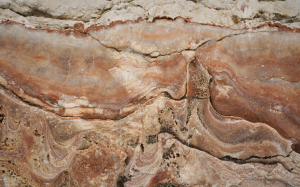
Marble’s beauty lies in its varied patterns, colours, and lustre, all of which are the result of its geological formation process. This natural stone has been prized for centuries for its aesthetic appeal and durability.
Marble’s Role in Furniture Design Through the Ages
Marble has a storied place in the history of architecture and furniture design. This beautiful stone has been a symbol of luxury and sophistication for thousands of years. From ancient Egypt to Renaissance Italy, marble’s natural beauty has been celebrated.
In ancient Egypt, marble was a choice material for statues and construction, showing its prestige early on. Moving forward, ancient Greece and Rome took marble’s use to new heights, employing it in iconic buildings and sculptures. These eras showcased marble’s strength and beauty, setting a standard for centuries to come.
The Renaissance period, especially in Italy, saw a revival of marble in art and furniture. Marble became a key element in the grand designs of the time. Craftspeople carved intricate details into marble, blending art and function in furniture.
Each of these key eras and cultures contributed to the rich history of marble in design. They laid the groundwork for marble’s continued use in modern furniture, where it adds a touch of elegance and history to any room.
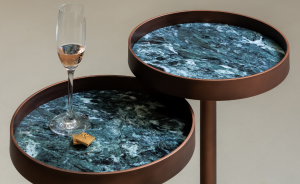
Types of Marble Used in Furniture
Marble furniture adds elegance and luxury to any space, with various types of marble and furniture pieces to choose from. Let’s dive into the details.
| Carrara Marble | Known for its soft white background and subtle grey veins, Carrara marble comes from Italy. It’s one of the most common types used in homes for its timeless beauty and affordability. |
| Calacatta Marble | Also from Italy, Calacatta marble is whiter than Carrara and features dramatic, bold veining. This type is often seen as more luxurious and is typically used in statement pieces. |
| Emperador Marble | Originating from Spain, Emperador marble comes in darker shades, ranging from light brown to rich chocolate, with fine veins. It adds warmth and sophistication. |
| Crema Marfil Marble | This Spanish marble has a creamy, beige background with subtle veining. Its neutral tone makes it versatile for various interior designs. |
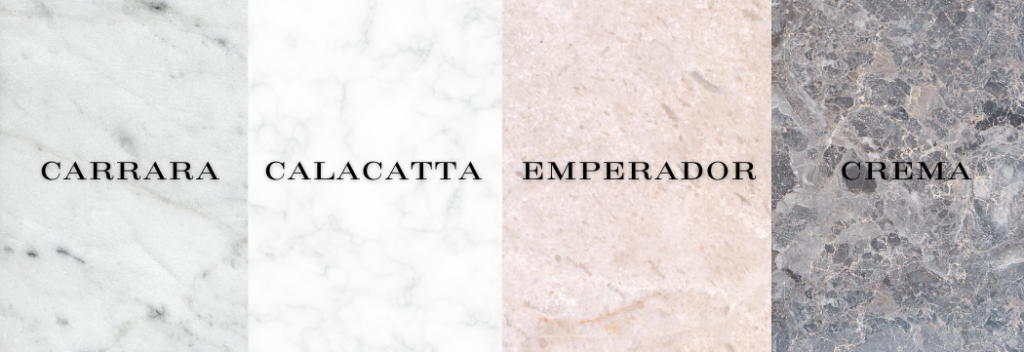
Different Marble Furniture Pieces
Marble finds its way into many furniture pieces, enhancing interiors with its elegance:
- Tables: Dining tables, coffee tables, and side tables made of marble are popular for their durability and beauty.
- Countertops: Marble countertops in kitchens and bathrooms are prized for their luxurious look and feel.
- Decorative Pieces: Items such as lamps, clocks, and vases made of marble add sophisticated touches to any decor.
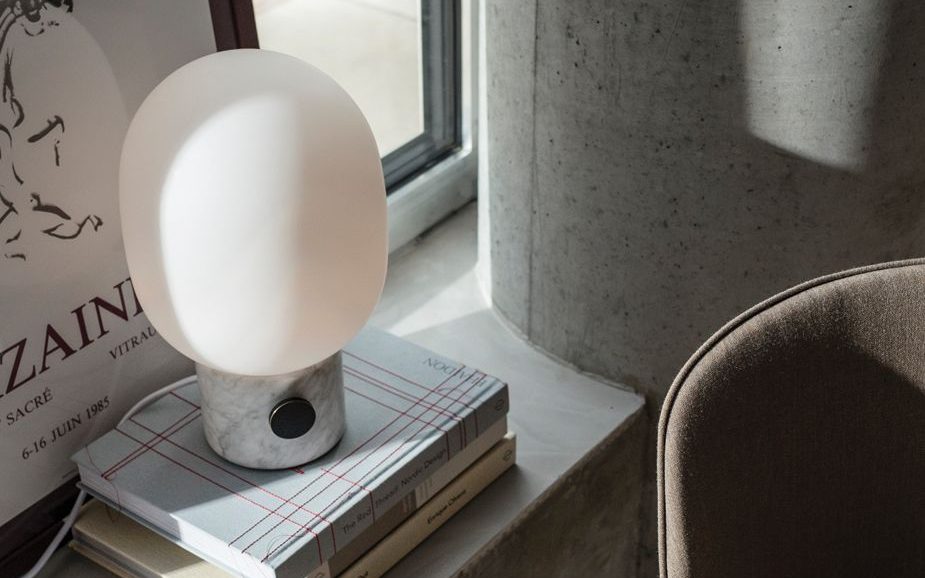
Trends and Styles in Marble Furniture
Marble furniture trends are always evolving. Currently, there’s a lean towards minimalist designs, with sleek, clean lines and thinner marble slabs. Mixing marble with other materials, like metal and wood, is also popular, offering a modern twist on classic luxury. The natural, unique patterns of marble are being celebrated, with designers choosing large, bold veining to make statement pieces. Marble’s versatility allows it to fit into various styles, from traditional to contemporary, making it a favoured choice for interior designers and homeowners alike.
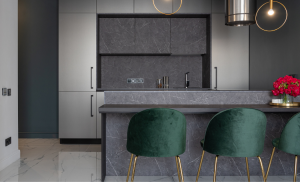
The Elegance of Marble: Pros and Cons
Marble furniture is not just a choice; it’s a statement. Its elegance and unique characteristics make it a popular choice, but it’s important to consider both sides.
Advantages of Marble Furniture
- Aesthetic Appeal: Marble’s natural patterns and colours add unmatched beauty to any piece of furniture. Each piece is unique, offering exclusive designs that can’t be replicated.
- Durability: When properly maintained, marble is incredibly durable. It can last generations, making it a timeless addition to any home.
- Cool Temperature: Marble naturally stays cool, making it an ideal surface in warmer climates or for certain culinary tasks.
Challenges with Marble Furniture
- Maintenance: Marble requires regular sealing to protect its surface. Without this, it’s prone to staining and etching, especially from acidic substances.
- Cost: High-quality marble table furniture comes with a higher price tag. The cost of marble, coupled with the craftsmanship required, can make it an investment.
- Vulnerability to Staining and Etching: Marble is porous and soft compared to other stones, making it susceptible to stains from spills and etches from acidic substances. This requires owners to be cautious with usage and maintenance.
Despite these challenges, the appeal of marble furniture remains strong. With proper care, the beauty and elegance of marble can offer a lifetime of enjoyment and sophistication in any setting.
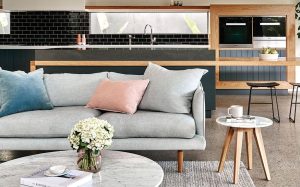
Essential Tips and Strategies for Marble Furniture Care
Maintaining the beauty of marble living room furniture requires know-how and regular attention. Here’s how to keep your marble pieces looking their best.
Tips on How to Clean Marble Table Top
| Regular Cleaning | Wipe marble surfaces with a soft, damp cloth to remove dust and spills. Avoid acidic cleaners; use a pH-neutral cleaner instead. |
| Use Coasters and Mats | Protect marble surfaces from stains and etches by using coasters under glasses and mats under hot dishes. |
| Immediate Spill Clean-up | Marble is porous, so blot spills immediately to prevent staining. |
| Dry After Cleaning | Always dry the marble surface with a soft towel after cleaning to prevent water spots and streaks. |
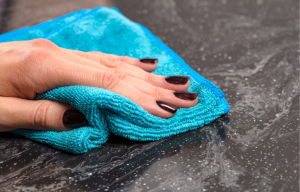
How to Remove Stains & Damages from Marble
| Stain Removal | For organic stains, create a poultice of baking soda and water. Apply to the stain, cover with plastic wrap, and leave it for 24 hours before washing off. Repeat if necessary. |
| Scratches and Chips | Minor scratches can be buffed out with fine-grit sandpaper. For chips and deeper scratches, it’s best to consult a professional. |
| Sealing | Regular sealing helps prevent stains and damage. Use a marble sealer annually or as recommended by the manufacturer. |
| Polishing | For extra shine, you can use a commercial marble polish. Follow the product instructions carefully to avoid damaging the surface. |

The Importance of Professional Care for Marble Furniture
For significant damage or to restore the shine to dull marble, professional help is recommended. Marble restoration experts can polish and repair surfaces, making them look new again. If your marble furniture has historical value or is an expensive piece, professional restoration can also help maintain its value. Seek out a reputable professional with experience in marble restoration for the best results.
How to Select the Ideal Marble Piece for Your Home
Choosing the right marble furniture involves more than just picking a piece that catches your eye. Consider these factors to find a piece that fits perfectly in your space and decor.
Elevating Your Space with the Timeless Beauty of Marble Furniture
| Colour | Marble comes in a range of colours, from classic white to black, green, and pink. Consider the room’s colour scheme and lighting when selecting marble patio furniture. |
| Veining | The veining in marble adds to its beauty and uniqueness. Decide whether you prefer subtle, fine veining or bold, dramatic patterns. |
| Finish | Marble finishes range from polished, glossy surfaces to honed, matte ones. A polished finish offers a luxurious look, while a honed finish provides a more understated elegance. |
| Space | Consider the size of the room and the marble piece. Larger rooms can handle bold pieces with dramatic veining, while smaller spaces may benefit from subtler pieces. |
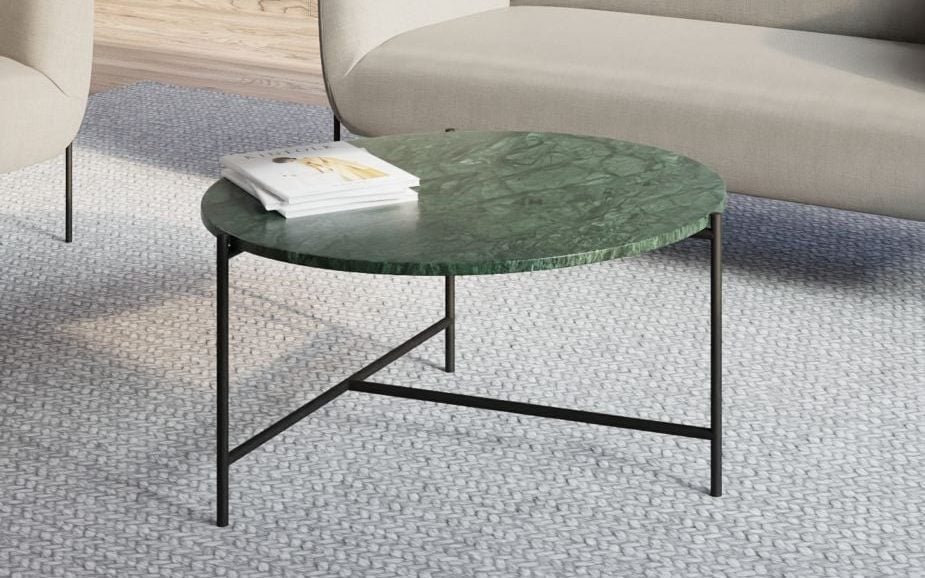
Matching Marble with Your Home Decor
Marble living furniture can complement any interior design style, from modern to traditional. Here are tips for integrating marble into your decor:
- Modern Spaces: Choose marble pieces with minimalist designs and clean lines. A monochrome colour palette works well.
- Traditional Interiors: Opt for marble with classic patterns and colours. Consider pieces with intricate details.
- Eclectic Homes: Mix and match different marble colours and patterns for a unique look. Pairing marble with various textures and materials can add depth to your decor.
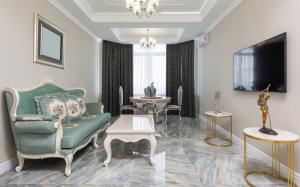
Budgeting for Marble Furniture
Marble furniture can vary widely in price, but there are options for every budget:
- High-End: For those willing to invest, bespoke marble pieces or designs from renowned brands offer exclusivity and luxury.
- Mid-Range: There are many quality, ready-made marble furniture pieces that offer style and durability without the premium price.
- Budget-Friendly: Look for marble-topped pieces where marble is used in combination with other materials. Second-hand shops or marketplaces can also be great sources for affordable marble living furniture.
Selecting marble dining furniture involves balancing aesthetics, functionality, and budget. By considering these factors, you can find a piece that enhances your space and brings joy for years to come.
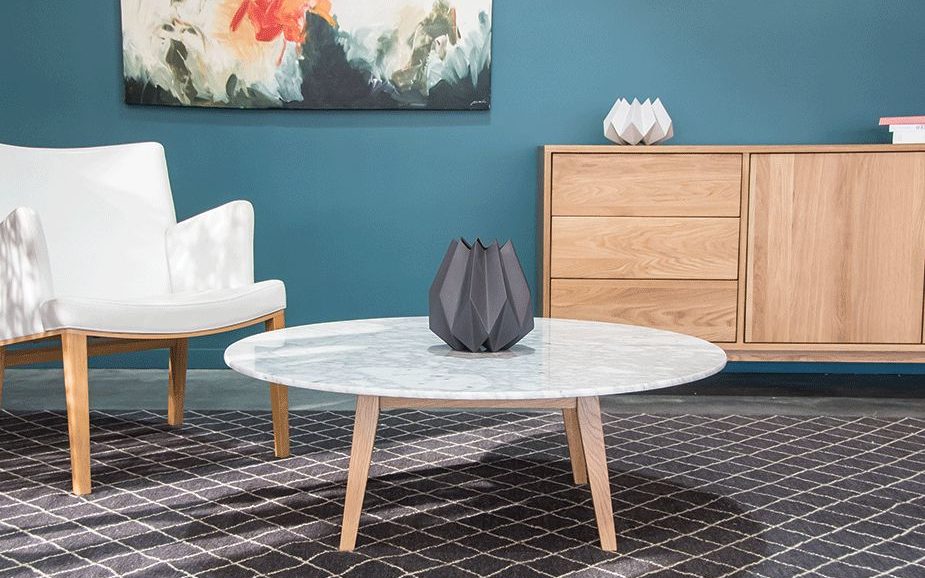
Future Trends: What’s Next for Marble Furniture?
| Technology Integration | Advances in technology will likely influence marble furniture design, with digital fabrication techniques enabling more complex and intricate designs. |
| Mixing Materials | The trend of mixing marble with other materials is set to continue and evolve. Combining marble with metals, woods, or even synthetic materials can create pieces that are both beautiful and functional, fitting into a wider variety of interior designs and personal styles. |
| Bold Colours and Patterns | While classic white and grey marbles will always have their place, there’s a growing interest in bolder, more colourful marbles. Vivid greens, blues, and even pinks may become more popular, as well as marbles with dramatic veining and patterns, offering statement pieces that can transform any space. |
| Eco-friendly Finishes | The use of non-toxic, eco-friendly finishes and sealants for marble will likely increase. These products not only protect the marble but also ensure a safer environment for homes and businesses. |
| Versatility in Use | Marble’s application will extend beyond traditional furniture pieces like tables and countertops. Expect to see more marble in lighting fixtures, wall accents, and even flooring inlays, as designers push the boundaries of how this timeless material can be used. |
| Focus on Craftsmanship | Despite advances in technology, there will be a renewed appreciation for the artisanal craftsmanship that goes into creating marble furniture. Hand-carved pieces with unique stories and heritage will be highly sought after, blending the lines between furniture and art. |
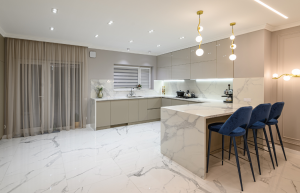
As these trends develop, marble dining furniture will continue to evolve, offering new ways to incorporate this luxurious material into our homes and lives.
Elevating Your Space with the Timeless Beauty of Marble Furniture
Marble furniture, with its natural beauty and enduring quality, adds unmatched value and elegance to any space. From the rich history of marble in architecture and furniture design to the latest trends in home decor, marble stands out as a timeless material. It combines durability with luxury, offering a variety of colours, patterns, and finishes to suit any style. Whether it’s a statement dining table, a sleek countertop, or an artistic decorative piece, marble living furniture is a testament to sophistication and style.
Marble is not just furniture; it’s an investment in your home’s beauty and character. Its versatility in design and application ensures that marble pieces can seamlessly integrate into any interior, enhancing the space with a touch of nature’s artistry. By selecting the right marble piece, caring for it properly, and embracing future trends, you can enjoy the timeless appeal of marble outdoor furniture for years to come.
From selecting the perfect marble piece to integrating it into your home decor, we’re here to provide you with all the information you need to make informed decisions. Marble dining furniture is more than just an item in your home, it’s a piece of history, a work of art, and a lasting investment. Let’s embrace the marvel of marble and transform our spaces with its timeless beauty.
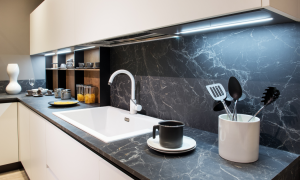
Frequently Asked Questions
Water stains are not usually permanent on marble. They can often be removed with a gentle cleaning or a poultice to draw out the moisture. However, hard water stains may require professional treatment to completely removed.
Olive oil is not recommended for marble as it can leave a residue and potentially stain the surface. For enhancing shine, use products specifically designed for marble care.
Windex or any ammonia-based cleaners should not be used on marble, as they can etch the surface. Stick to pH-neutral cleaners specifically designed for marble.
To restore shine to marble, use a marble polish or polishing powder designed for marble. Follow the instructions carefully, usually involving buffing the surface with a soft cloth.
Marble can be identified by its veining pattern and soft texture. It’s also cooler to the touch compared to other stones. A scratch test (scratching the surface with a metal object) can help identify marble due to its relative softness.
